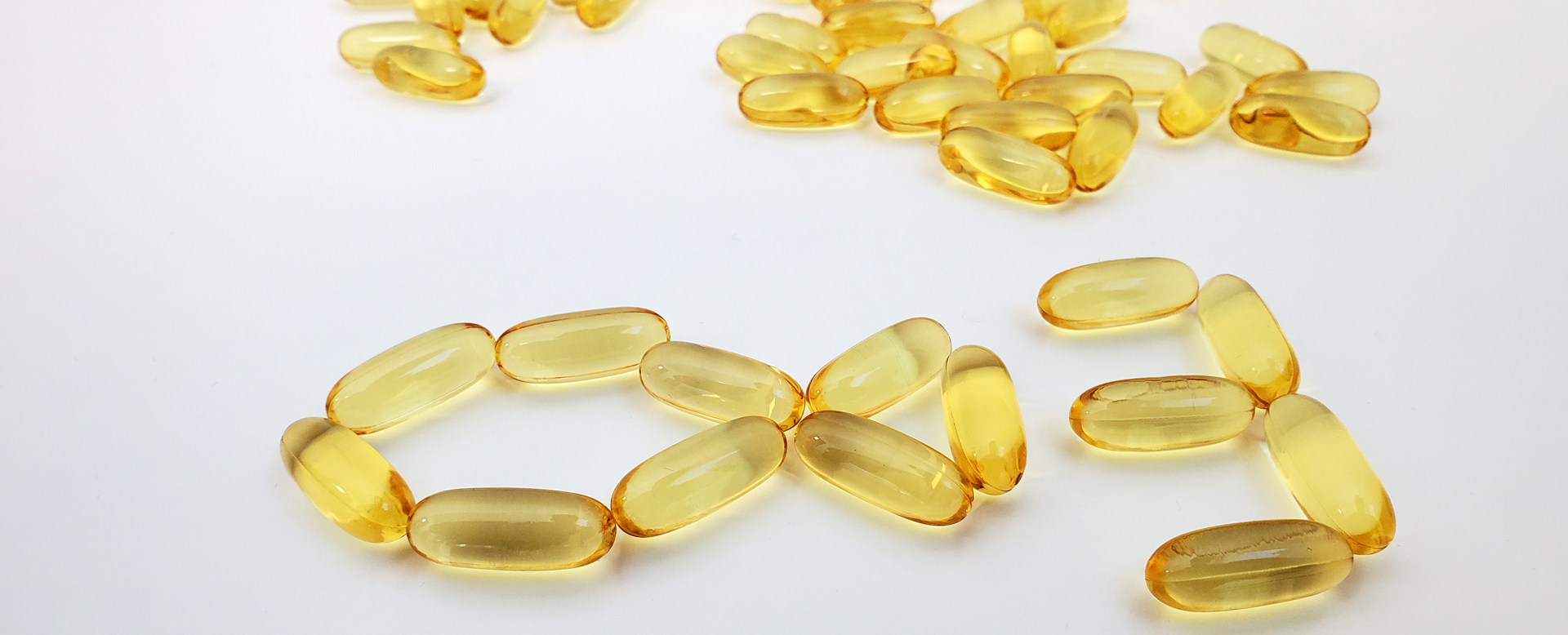The COVID-19 pandemic is continuing to exert significant effects on morbidity and mortality, posing a huge burden on public healthcare and the economy. Although vaccines are now available as preventative measures, bottle necks in rapid deployment and lack of cost-effective treatment strategies are profoundly impacting successful management of the pandemic worldwide. Natural products, especially vitamin D, have been receiving increased attention amongst scientific and medical communities for their potential benefits in the management of adverse effects in COVID-19 infected individuals.
It is now well established that COVID-19 pathogenesis, severity and particularly death, is mediated by a rapid rise of inflammatory cytokines such as TNF-alpha, IL-1β, and IL-6, leading to a “cytokine storm”. These new findings make it clear that for reducing morbidity and mortality from COVID-19 infection, an effective anti-inflammatory therapeutic approach is critical.1
Omega-3 fatty acids (EPA and DHA) have been extensively studied for their anti-inflammatory properties. EPA and DHA are known precursors to a cluster of inflammation-resolving mediators (IRMs; resolvins, maresins, and protectins) involved in the resolution of acute inflammation. A number of different mechanisms have been attributed to the anti-inflammatory effects of IRMs, especially their ability to suppress cytokine production, monocyte/macrophage-mediated uptake of debris, apoptosis of neutrophils, and clearing of microbes, thereby ensuring a return to homeostasis.2 It has been shown that resolvin E1, resolvin D1, and protectin D1 prevent the infiltration of neutrophils into sites of inflammation, and IL-1β and TNF-α production is inhibited by resolvin D1 and protectin D1. Noteworthy, higher EPA and DHA levels also reduce arachidonic acid membrane levels, a main contributor of pro-inflammatory oxylipins (prostaglandins and leukotrienes). In addition, it has been demonstrated that EPA/DHA in inflammatory cells down regulate the activation of pro-inflammatory transcription factor, NF-κB, suppressing the whole intracellular inflammatory cascade.1, 2 Scientists suggest that all of these actions in concert can potentially block the “cytokine storm”, especially in alveolar macrophages, currently the key contributor of COVID-19 mortality. In human clinical studies, EPA supplementation alone (3 g/d for 10 weeks) significantly reduced the expression of TNFα from LPS-stimulated monocytes and with similar dose-related DHA reductions in IL-6 and MCP-1 were observed as well. Substantial evidence from meta-analyses of multiple RCTs shows that treatment with omega-3 fatty acids consistently lowers cytokine levels.3, 4, 5, 6
This recent study by Asher et al, 2021 has demonstrated interesting and encouraging observations on the potential therapeutic applications of this important class of nutrients, omega-3 fatty acids. In this pilot study with 100 patients, researchers evaluated if elevated omega-3 status (RBC EPA+DHA levels) would reduce the risk for death in COVID-19 infected patients. Omega-3 status was assessed by analyzing the banked blood samples drawn at hospital admission. Based on their omega-3 status, patients were classified and grouped into four quartiles leading to 25% of the patients in each quartile. Fourteen patients died and interestingly, there was only one death in the top quartile, with the remaining 13 deaths in the other three quartiles. When the study researchers conducted age-and-sex adjusted regression analyses, it was found that individuals in the highest omega-3 quartile were 75% less likely to die than those in the lower three quartiles. These results suggest that the relative risk for death was about four times higher in those with a lower omega-3 status compared to those with higher levels.
Regardless of not meeting statistical significance, the study results clearly shows a strong trend indicating a relationship between blood omega-3 fatty acids and COVID-19 mortality risk along with the well-established evidence on the anti-inflammatory effects of omega-3 fatty acids. More well-controlled studies are warranted to confirm the findings of this study in a larger cohort.
References:
- Asher A et al. “Blood omega-3 fatty acid and death from COVID-19: a pilot study.” MedRxiv, Published online ahead of print on January 8, 2021
- Hathaway D, et al. Omega 3 Fatty Acids and COVID-19: A Comprehensive Review. Infect Chemother. 2020;52(4):478-495. doi:10.3947/ic.2020.52.4.478
- Tan A., et al. Supplementation with eicosapentaenoic acid and docosahexaenoic acid reduces high levels of circulating proinflammatory cytokines in aging adults: a randomized, controlled study. Prostaglandins Leukot. Essent. Fatty Acids. 2018;132:23–29.
- AbuMweis S., et al. Eicosapentaenoic acid and docosahexaenoic acid containing supplements modulate risk factors for cardiovascular disease: a meta-analysis of randomised placebo-control human clinical trials. J. Hum. Nutr. Diet. 2018;31:67–84.
- O’Mahoney L.L., et al. Omega-3 polyunsaturated fatty acids favourably modulate cardiometabolic biomarkers in type 2 diabetes: a meta-analysis and meta-regression of randomized controlled trials. Cardiovasc. Diabetol. 2018;17:98.
- Li K., et al. Effect of marine-derived n-3 polyunsaturated fatty acids on C-reactive protein, interleukin 6 and tumor necrosis factor alpha: a meta-analysis. PLoS ONE. 2014;9:e88103.


